If you're looking for shocking menstrual stimulants, you might be surprised by the power of fresh pineapple, ginger, and turmeric. These natural options can help stimulate menstrual flow and regulate cycles. While unripe papaya, black cohosh, and dong quai present cautionary tales due to potential risks, they're still popular choices. Vitamin C plays a key role in menstrual health, too. There's so much more to explore about these herbal remedies and their effects!
Key Takeaways
- Fresh pineapple contains bromelain and vitamin C, potentially stimulating menstrual flow and supporting reproductive health.
- Ginger is effective for menstrual discomfort and regularity, comparable to NSAIDs with fewer side effects.
- Turmeric's curcumin aids in managing menstrual pain and hormonal balance, promoting overall menstrual health.
- Caution is advised with unripe papaya, black cohosh, and dong quai due to potential side effects and interactions.
- Consultation with healthcare professionals is essential before using any herbal remedies for menstrual regulation.
Fresh Pineapple: A Natural Inducer

If you're looking for a natural way to potentially induce your menstrual cycle, fresh pineapple might be worth considering. This tropical fruit contains bromelain, an enzyme that can soften the cervix and may stimulate menstrual flow by influencing estrogen levels.
Rich in vitamin C, fresh pineapple supports reproductive health and could help promote menstruation. You might find that consuming pineapple, especially in the days leading up to a missed period, encourages uterine contractions due to its anti-inflammatory properties.
While many people tout its menstrual benefits, keep in mind that scientific research on its effectiveness as a natural menstrual inducer is limited.
Nevertheless, adding fresh pineapple to your diet can offer valuable nutrients that promote overall wellness.
Ginger: The Versatile Menstrual Aid
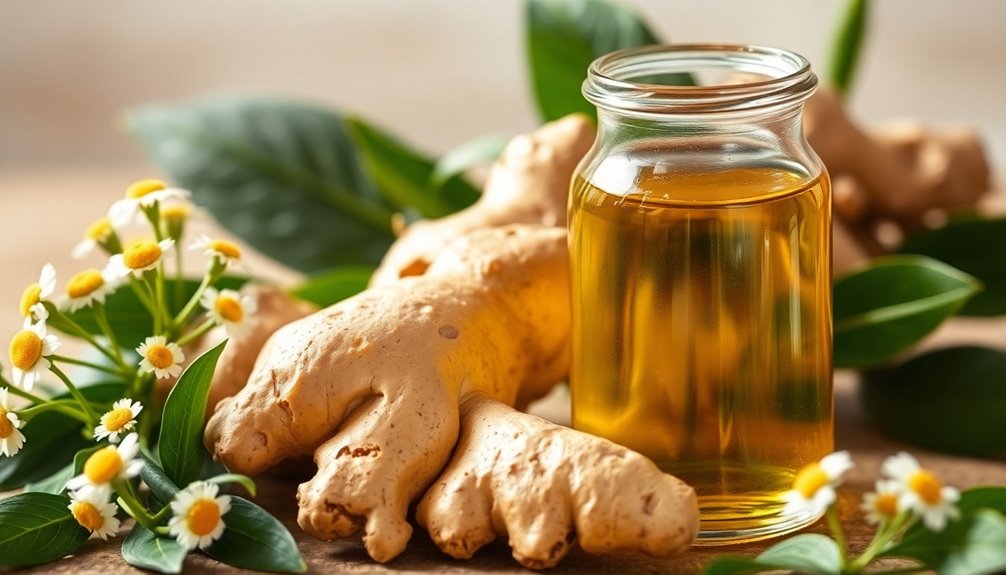
Ginger serves as a powerful ally for those looking to alleviate menstrual discomfort and regulate their cycles. This traditional herb's anti-inflammatory properties help reduce menstrual pain and cramps, making it a go-to option for many.
Research shows that ginger can be as effective as nonsteroidal anti-inflammatory drugs (NSAIDs) for managing menstrual pain, but with fewer side effects. To experience its benefits, consider a dosage of approximately 500 mg taken three times a day.
Not only does ginger help soothe discomfort, but it also plays a role in improving overall menstrual health and can aid in regulating irregular periods.
Turmeric: The Golden Spice for Hormonal Balance
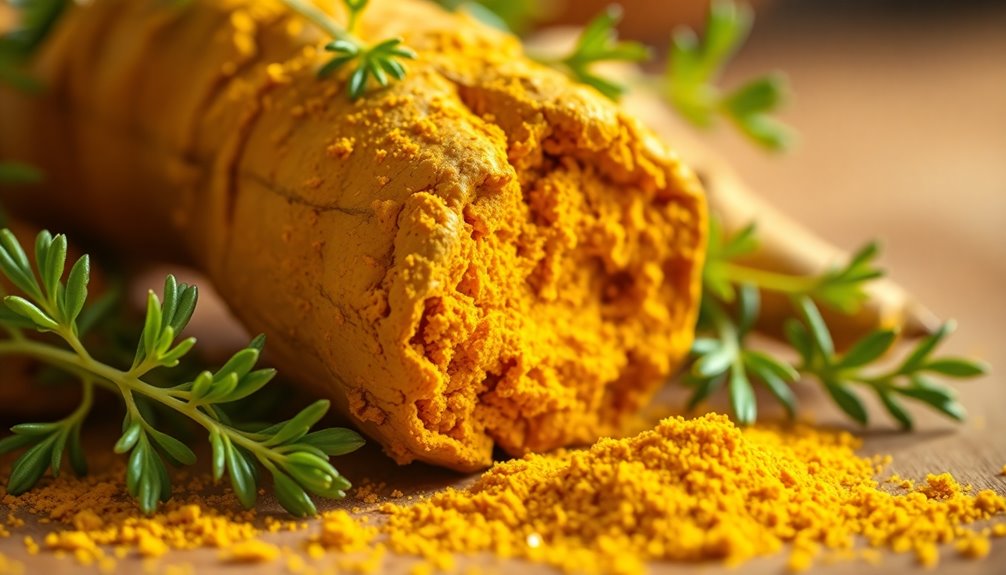
Turmeric's rich content of curcumin can help you manage menstrual pain thanks to its anti-inflammatory properties. This golden spice might also support hormonal regulation and even enhance your mood during tough cycles. If you're considering incorporating turmeric, typical dosages range from 100 mg to 500 mg taken twice daily. Additionally, essential oils can be an effective complementary approach to enhance relaxation and mood during your menstrual cycle.
Hormonal Regulation Benefits
While many women struggle with hormonal imbalances that can disrupt their menstrual cycles, incorporating turmeric into your routine might offer significant benefits.
Curcumin, the active compound in turmeric, exhibits estrogen-like effects that can help regulate hormone levels and improve menstrual health.
Consider these advantages of turmeric:
- Reduces inflammation linked to menstrual pain
- Alleviates symptoms of premenstrual syndrome (PMS)
- Enhances detoxification with antioxidant properties. Moreover, the growing popularity of clean beauty products emphasizes the importance of using non-toxic ingredients for overall well-being.
Anti-Inflammatory Properties
When you incorporate turmeric into your diet, you're tapping into its remarkable anti-inflammatory properties that can greatly benefit your menstrual health.
This golden spice contains curcumin, a powerful compound that helps reduce menstrual pain and may enhance hormonal balance. Curcumin mimics estrogen, which can alleviate PMS symptoms and improve your overall quality of life during menstruation.
Regular consumption of turmeric can also regulate your menstrual cycles by influencing estrogen and progesterone levels in your body, making those monthly challenges a bit easier.
You can enjoy turmeric through curries or supplements, allowing its antioxidant benefits to support your menstrual health while providing additional health advantages. Additionally, studies suggest that turmeric may improve liver function, which can further contribute to overall health during your menstrual cycle.
Embrace turmeric, and let it help you navigate your menstrual journey with more ease.
Recommended Dosage Guidelines
Incorporating turmeric into your routine can lead to significant improvements in your menstrual health, especially when you follow recommended dosage guidelines.
To maximize the benefits of turmeric, consider these key points:
- Typical dosages for turmeric supplementation range from 100 mg to 500 mg, taken twice daily.
- Combining turmeric with black pepper enhances curcumin's bioavailability, boosting its effectiveness.
- A balanced diet rich in turmeric may help elevate your mood and alleviate PMS symptoms.
- Additionally, a diet rich in whole, unprocessed foods can further support hormonal balance and overall health.
Before starting any supplementation, it's essential to consult a healthcare provider, especially if you're on other medications or have existing health conditions.
Unripe Papaya: A Cautionary Option
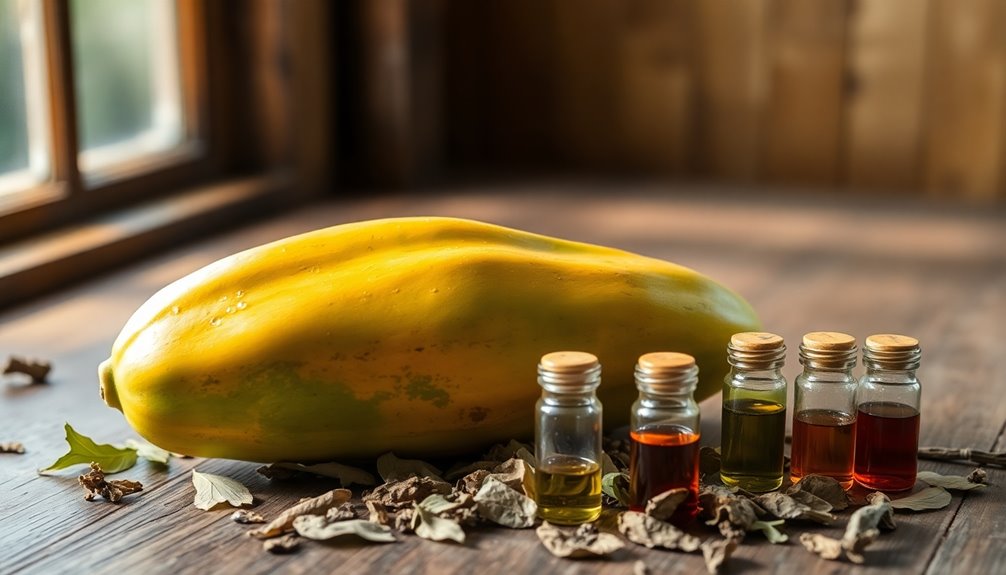
Unripe papaya might seem like an appealing option for stimulating menstruation, thanks to its potential to influence estrogen and promote uterine contractions.
However, you should be cautious, as its effects can vary widely and it may not be safe for everyone, especially if you're pregnant or trying to conceive.
It's crucial to consult with a healthcare professional before considering unripe papaya for this purpose.
Potential Benefits Explored
While many seek natural remedies for menstrual regulation, unripe papaya stands out as a cautionary option worth considering. This fruit may stimulate uterine contractions and influence hormonal balance, potentially aiding your menstrual cycle. However, it's essential to approach with care.
Imagine the benefits of unripe papaya offering:
- A natural boost to your hormonal balance
- Support for timely menstrual regulation
- An alternative to conventional herbal remedies
Despite these possibilities, the safety and efficacy of unripe papaya aren't fully understood.
Always consult with a healthcare professional before using it for menstrual regulation, ensuring it aligns with your individual health circumstances. Your well-being should always come first!
Risks and Precautions
Considering the potential risks associated with unripe papaya, it's important to understand how it can affect your health.
While some suggest unripe papaya for menstrual regulation due to its ability to induce uterine contractions, its safety during pregnancy raises serious concerns.
Limited scientific research highlights the need for caution, particularly if you have an underlying health condition.
You should consult a healthcare professional before trying unripe papaya, as it may lead to adverse effects on reproductive health and pregnancy safety.
Weighing the risks and precautions is vital; the benefits touted by some may not outweigh the potential dangers.
Always prioritize your health and well-being when considering natural remedies like unripe papaya.
The Role of Vitamin C in Menstrual Health
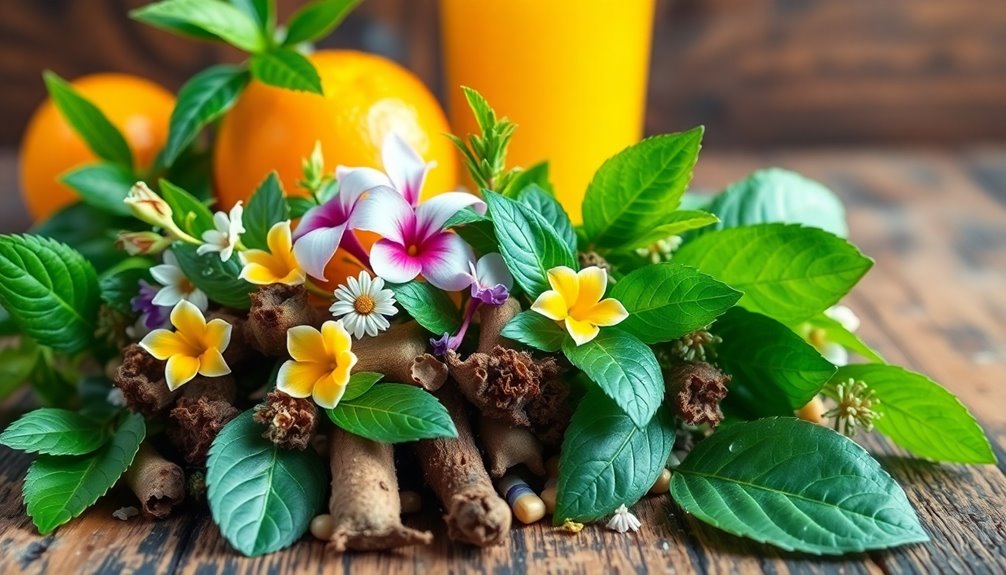
Vitamin C plays an essential role in supporting menstrual health, as it may help regulate estrogen levels and influence the menstrual cycle. By incorporating Vitamin C into your diet, you can promote hormonal balance and potentially reduce menstrual irregularities, especially if you have conditions like polycystic ovary syndrome (PCOS).
To boost your daily intake, consider these dietary sources:
- Juicy oranges
- Sweet strawberries
- Crunchy bell peppers
The recommended daily intake for adult women is about 75 mg, easily achievable through a balanced diet rich in fruits and vegetables.
While Vitamin C is generally safe from food sources, be cautious with supplements, as excessive doses can lead to gastrointestinal issues. Therefore, consult your healthcare provider before starting any regimen.
Herbal Remedies: Black Cohosh and Dong Quai

Herbal remedies like black cohosh and dong quai have gained popularity for their potential benefits in managing menstrual health.
Black cohosh may help regulate menstrual cycles by mimicking estrogen, but if you have liver disorders or are on statin medications, caution is essential.
Dong quai is believed to enhance menstrual flow and stimulate uterine contractions, yet individuals taking anticoagulant medications should be careful due to its blood-thinning effects.
Both herbs can generally be well-tolerated in small doses, but their effectiveness varies based on individual health conditions.
Always consult a healthcare professional before trying these herbal remedies.
If you're pregnant or nursing, it's best to avoid black cohosh and dong quai, as they may pose risks during these periods.
Parsley Tea: An Unexpected Ally
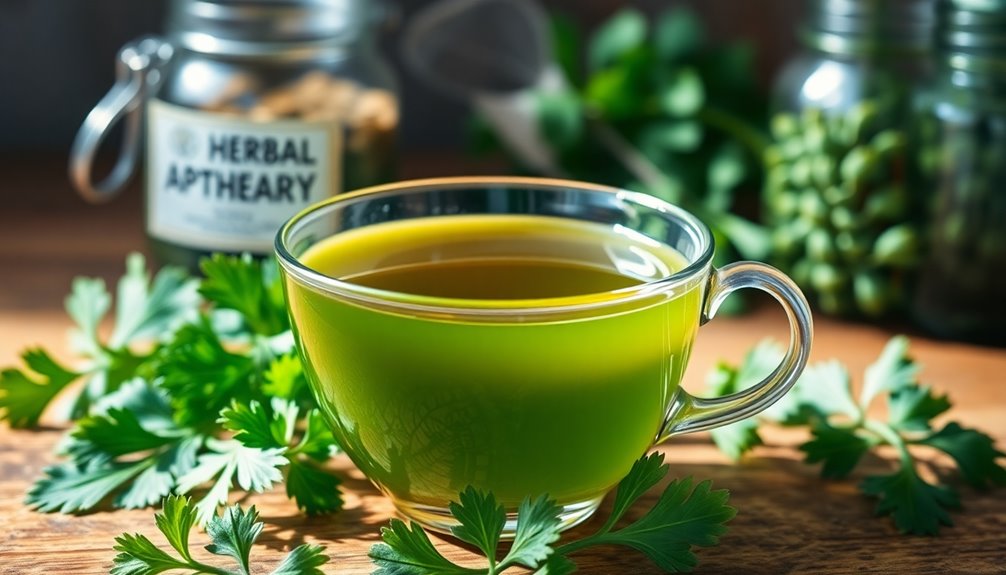
While black cohosh and dong quai are well-known for menstrual support, parsley tea might surprise you as a beneficial option. This herbal remedy is believed to contain compounds that may influence estrogen production and stimulate menstrual flow.
Traditionally, it's used to help regulate menstrual cycles, but scientific evidence is limited.
Traditionally, parsley tea is used to help regulate menstrual cycles, though scientific support remains limited.
Consider these when exploring parsley tea:
- Natural remedy for menstrual health
- Potential risks for those on anticoagulants like warfarin
- Not recommended for pregnant or nursing individuals
Before diving into parsley tea, consult a healthcare professional to verify it's safe and appropriate for you. It could be an unexpected ally in your menstrual health journey!
Frequently Asked Questions
What Medication Can Stimulate Period?
If you're looking to stimulate your period, several medications might help.
Hormone therapies like progestin can regulate your cycle, while NSAIDs such as ibuprofen may reduce pain and inflammation, possibly encouraging menstruation.
Oral contraceptives can also offer more predictable cycles.
Additionally, clomiphene citrate is used to induce ovulation, but it might stimulate your period too.
Always consult with a healthcare professional before trying any medication to verify it's right for you.
What Did Native Americans Use for Menstrual Cramps?
Native Americans used various herbs to ease menstrual cramps. You might find cramp bark beneficial, as it helps relieve uterine pain and relaxes muscles.
Black cohosh is another option, mimicking estrogen effects to reduce discomfort. Brewing herbal teas from ginger and peppermint can soothe cramps and reduce inflammation.
Additionally, red clover supports hormone balance. Their holistic approach combined these remedies with community support, emphasizing the importance of both physical and emotional well-being during menstruation.
What Herbs Trigger Menstruation?
Did you know that around 80% of women experience some form of menstrual discomfort?
If you're looking for herbs that might trigger menstruation, consider ginger, black cohosh, dong quai, and parsley tea.
Ginger may promote uterine contractions, while black cohosh mimics estrogen effects. Dong quai enhances blood circulation, and parsley tea can influence estrogen production.
However, it's essential to consult a healthcare professional before using any of these, especially if you're on medication or pregnant.
How Can I Induce My Period Urgently?
If you need to induce your period urgently, consider light physical activity, like yoga or stretching, to stimulate your abdominal muscles.
You can also try ginger, taking 500 mg three times a day, or fresh pineapple for its bromelain content.
Herbal teas like parsley could help, but be cautious with interactions.
Finally, managing stress through mindfulness could also promote your cycle.
Always consult a healthcare provider before trying new methods.
Conclusion
In exploring these menstrual stimulant herbs and medications, it's clear nature offers some surprising allies. While fresh pineapple and ginger might sound like kitchen staples, they can actually help regulate your cycle. Remember, though, that not every option is suitable for everyone—like unripe papaya, which can be risky. So, always listen to your body and consult a healthcare professional before trying new remedies. After all, your menstrual health is personal, and what works for one might not work for another!









